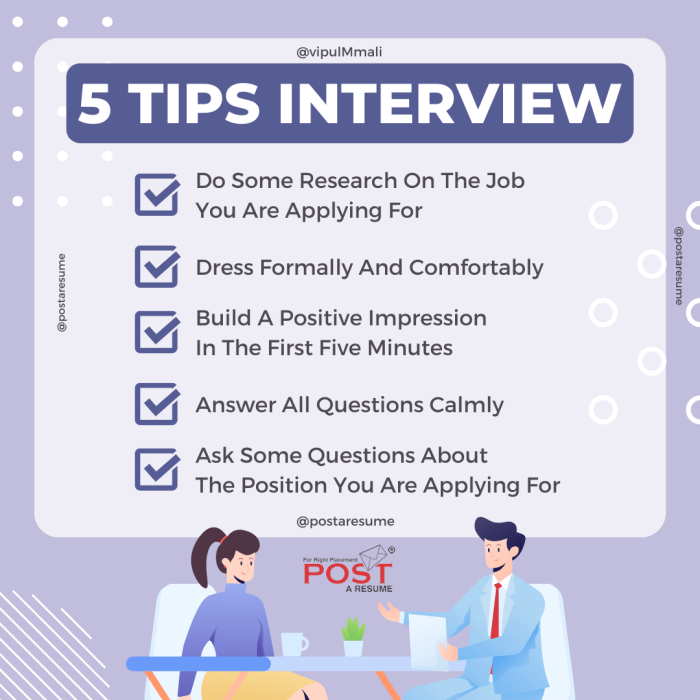Job interview preparation tips are crucial for acing your next interview. From researching the company to mastering behavioral questions, this guide covers everything you need to know to impress your potential employer.
Whether you’re preparing for an in-person or virtual interview, these tips will help you stand out from the competition and land your dream job.
Job Interview Preparation Tips

Researching the company before an interview is crucial as it demonstrates your interest and preparedness for the role. It allows you to tailor your answers and questions to align with the company’s values and goals.
Obtain recommendations related to Job openings in healthcare sector that can assist you today.
Practicing Common Interview Questions
- Practice answering common interview questions such as “Tell me about yourself” or “What are your strengths and weaknesses” to boost your confidence and articulate your responses clearly.
- Utilize online resources or enlist the help of a friend to conduct mock interviews to simulate the real interview experience.
- Focus on showcasing your skills and experiences that are relevant to the position you are applying for.
Preparing Questions to Ask the Interviewer
- Craft insightful questions to ask the interviewer about the company culture, team dynamics, or growth opportunities to demonstrate your interest and engagement in the role.
- Avoid questions related to salary or benefits during the initial interview stages.
Dressing Appropriately for a Job Interview
- Choose professional attire that aligns with the company’s dress code and industry standards.
- Ensure your outfit is clean, well-fitted, and free of wrinkles or stains to make a positive first impression.
- Accessorize minimally and opt for neutral colors to convey professionalism.
Arriving Early for an Interview
- Plan your route in advance and account for potential traffic or delays to arrive at least 15 minutes early for the interview.
- Use this extra time to compose yourself, review your notes, and mentally prepare for the interview.
- Punctuality demonstrates respect for the interviewer’s time and eagerness for the opportunity.
Behavioral Interview Preparation

Behavioral interviews are a type of job interview where candidates are asked to provide specific examples of past behaviors and experiences in order to demonstrate their skills and competencies. These interviews are used by employers to assess how a candidate has handled various situations in the past, as a way to predict future behavior in similar circumstances.
Common Behavioral Interview Questions
- “Can you tell me about a time when you had to work on a team to achieve a goal?”
- “Describe a situation where you had to deal with a difficult coworker or customer.”
- “Share an example of a time when you had to overcome a challenge or obstacle in the workplace.”
The STAR Method
The STAR method is a structured approach to answering behavioral interview questions:
- Situation: Describe the context or background of the example.
- Task: Explain the specific task or goal you were working towards.
- Action: Detail the actions you took to address the situation.
- Result: Discuss the outcome of your actions and any lessons learned.
Structuring Responses in a Behavioral Interview
When answering behavioral interview questions, it is important to structure your responses effectively:
- Start by clearly stating the situation or task you were faced with.
- Describe the actions you took in response to the situation.
- Highlight the results of your actions and any positive outcomes achieved.
- Reflect on what you learned from the experience and how it has influenced your approach to similar situations.
Showcasing Skills and Experiences
To effectively showcase your skills and experiences in a behavioral interview, remember to:
- Choose examples that are relevant to the job you are applying for.
- Quantify your achievements where possible to demonstrate impact.
- Use specific examples and anecdotes to make your responses memorable.
- Stay focused on the key skills and competencies the interviewer is looking for.
Virtual Interview Preparation: Job Interview Preparation Tips

When it comes to virtual interviews, preparation is key to making a positive impression on your potential employer. This includes ensuring you have the right technical setup, maintaining professionalism through body language, and effectively building rapport with interviewers.
Technical Setup for Virtual Interviews
- Ensure you have a stable internet connection and a quiet, well-lit space for the interview.
- Test your audio and video equipment beforehand to avoid any technical issues during the interview.
- Familiarize yourself with the video conferencing platform being used, such as Zoom or Skype.
Maintaining Eye Contact and Body Language in a Virtual Setting
- Position your camera at eye level to maintain eye contact with the interviewer.
- Sit up straight and dress professionally to convey a sense of professionalism.
- Avoid fidgeting or looking away from the camera during the interview.
Handling Distractions during a Virtual Interview
- Inform household members of your interview time to minimize interruptions.
- Close unnecessary tabs or applications on your computer to stay focused during the interview.
- Use headphones to block out external noise and improve audio quality.
Building Rapport with Interviewers in a Virtual Environment, Job interview preparation tips
- Engage in small talk at the beginning of the interview to establish a connection with the interviewer.
- Maintain a positive attitude and show enthusiasm for the role throughout the interview.
- Ask thoughtful questions about the company or role to demonstrate your interest.
Testing Equipment before a Virtual Interview
- Check your internet connection, camera, microphone, and lighting to ensure they are working properly.
- Run a test call with a friend or family member to confirm that everything is set up correctly.
- Having a backup device or alternative communication method in case of technical difficulties.